Analysis of ICANN revenue shows ambiguity in their records
Click to download a PDF of the Analysis
In 2014, CIS' Sunil Abraham demanded greater financial transparency of ICANN at both the Asia Pacific IGF and the ICANN Open Forum at the IGF. Later that year, CIS was provided with a list of ICANN's sources of revenue for the financial year 2014, including payments from registries, registrars, sponsors, among others, by ICANN India Head Mr. Samiran Gupta.This was a big step for CIS and the Internet community, as before this, no details on granular income had ever been publicly divulged by ICANN on request.1 Our efforts have resulted in this information now being publicly available from the years 2012 onwards. We then decided to analyze all these years of financial data collaborating with Ashoka fellow Arjun Venkatraman and following are our observations:
To get a clear picture of ICANN's revenue, it can be seen that over the years it has been growing steadily. In 2016 it was 1.7 times the revenue it made in 2012.
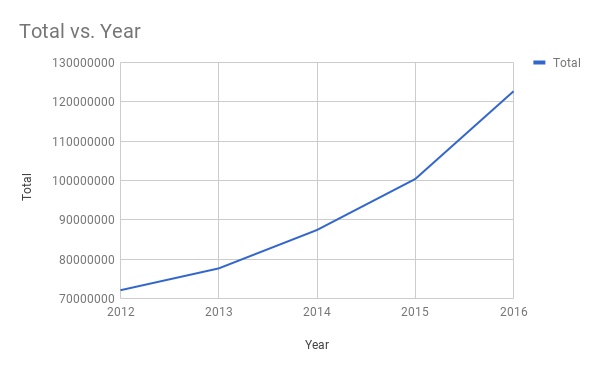
A breakdown by country reveals that a significantly higher proportion of their revenue is from sources registered in the United States.
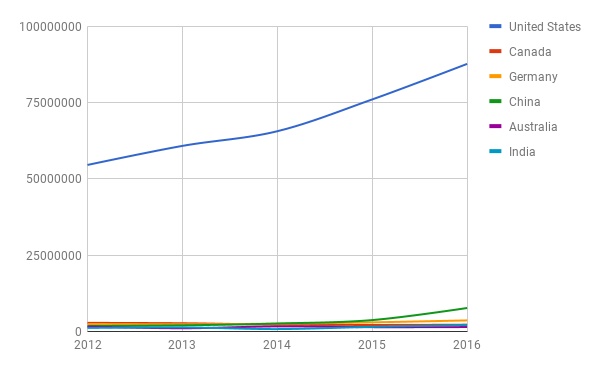
It is also interesting to note that revenue from China has seen a spike in the past 2 years, especially in the period of 2015-2016. Verisign CEO, James Bidzos confirmed in an interview to analysts that Chinese activity had surprised them as well though they expected the activity to slow down in the second quarter of 2016.2
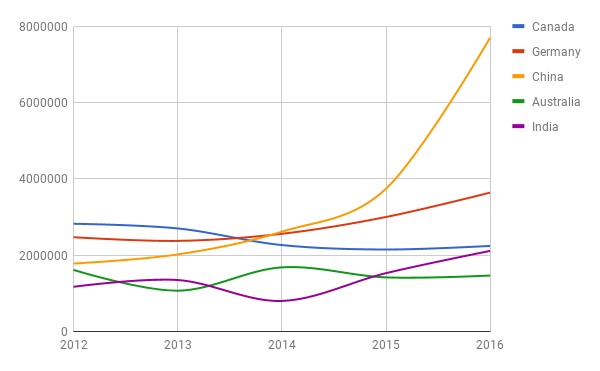
Verisign also happens to be the top paying customer for ICANN every year, running the .com/.net names. Their payments are orders of magnitude greater than payments made by any other single entity or even several collective entities.
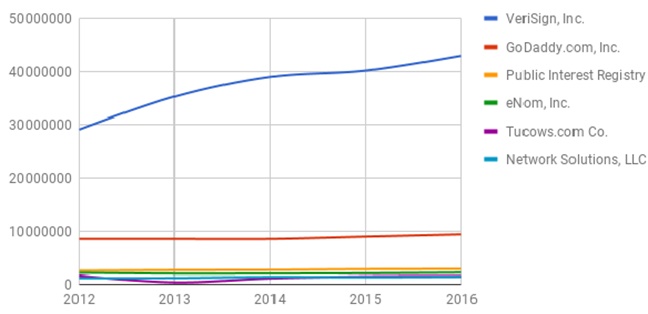
ICANN differentiates its sources of revenues by each class of entity which stand for the following:
- RYN - Registry
- OTH - Other
- RYG - Registry
- RIR - Regional Internet Registry
- RYC - ccTLD (Top Level Domains)
- IDN - Internationalized Domain Names
- RAR - Registrar
- SPN - Sponsor
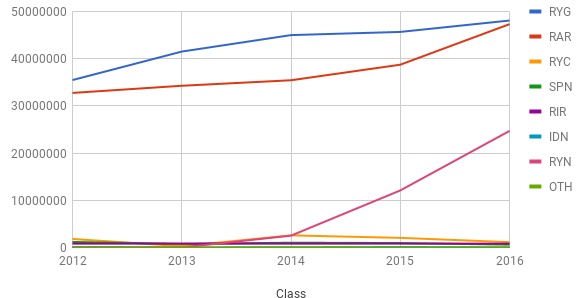
It is evident that the Registries and Registrars contribute the most to revenue however the classification of these groups in itself is ambiguous. RYG and RYN both stand for registry but we do not find any explanation given for the double entry for a single group. Secondly, Sponsors are included yet it is unclear how they have sponsored ICANN, whether through travel and accommodation of personnel or any other mode of institutional sponsorship. The Regional Internet Registries are clubbed under one heading and as a consequence it is not possible to determine individual RIR contribution such as how much did APNIC pay for the Asia and Pacific region. The total payment made by RIRs is a small fraction of the payments made by many other entities and they all pay through the Numbers Resources Organization (NRO), who is listed as paying from Uruguay however the MOU creating the NRO does not specify their location as being there. The NRO website states that " RIRs may be audited by external parties with regards to their financial activities or their operations. RIRs may also allow third parties to report security incidents with regards to their services." 3 Their records show that financial disclosure is done in an inconsistent manner with the last publication from AFRINIC being for the year 2013 4 while the RIPE NCC who coordinates the area of Central Europe, Middle East and Russia last published an annual report for the year 2016 but had no financial information in it. 5
The most frequently found words in their sources which can give us an idea of the structure of the contributing entity yields the following result.
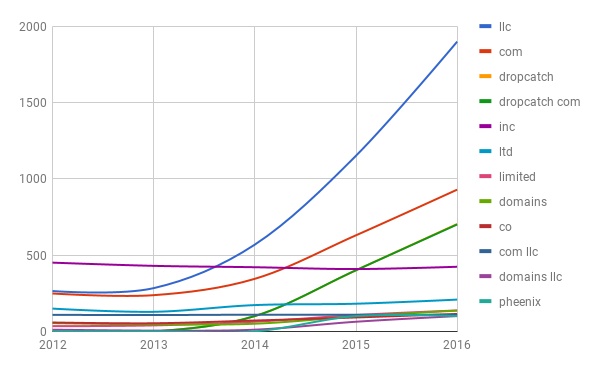
Several clients have registered multiple corporate entities to increase their payments to ICANN such as DropCatch, Everest and Camelot. 6 The first of them, DropCatch, is a domain drop catcher, essentially selling expired domain names to the highest bidder. By the end of 2016, about 43% of all ICANN-accredited registrars were controlled by them. 7
Many clients have reported themselves from different countries over the years as well such as 'Verisign Sarl' which has been reported as originating from Switzerland and in a different year from the United States. 8 Another curious case is of the entity, 'Afilias plc', which when categorized as a sponsor (SPN) is reported from Ireland however as a registry (both RYG and RYN) is reported from the United States. Some entities have originated from one place such as the United Arab Emirates and then moved to other countries such as India.
To summarize, the key takeaways from the information we have dissected so far are:
- ICANN's revenue has been steadily increasing with the 2016 seeing a 1.6 times increase of its revenue generated in 2012.
- United States is the country that most of the revenue originates from.
- After the US, China is now the largest contribution to ICANN revenue, significantly increase their contributions from 2015.
- Verisign is the top contributing entity, their contribution much greater than other entities.
- Registries and Registrars are the main sources of revenue though there is ambiguity as to the classifications provided by ICANN such as the difference between RYG and RYN. The mode of contribution of sponsors exactly is not highlighted either.
- Several entities have been listed from different places in different years, sometimes depending on the role they have played such as whether they are a sponsor or registry. Registering multiple corporate entities to acquire more registrars has occurred as well.
1. Venkataraman, P. (2017). CIS' Efforts Towards Greater Financial Disclosure by ICANN . [online] The Centre for Internet and Society.[Accessed 14 Mar. 2018].
2. Murphy, K. (2016). Verisign has great quarter but sees China growth slowing | Domain Incite - Domain Name Industry News, Analysis & Opinion . [online] DomainIncite. [Accessed 14 Mar. 2018].
3. Nro.net. (2018). RIR Accountability Questions and Answers | The Number Resource Organization . [online] [Accessed 11 Mar. 2018].
6. Murphy, K. (2016). DropCatch spends millions to buy FIVE HUNDRED more registrars | Domain Incite - Domain Name Industry News, Analysis & Opinion . [online] DomainIncite.[Accessed 13 Mar. 2018].



